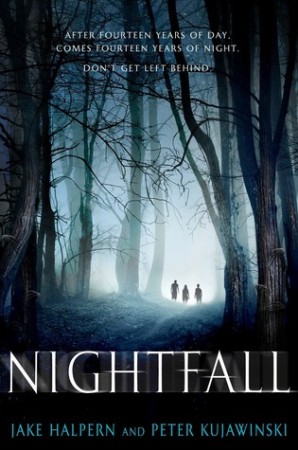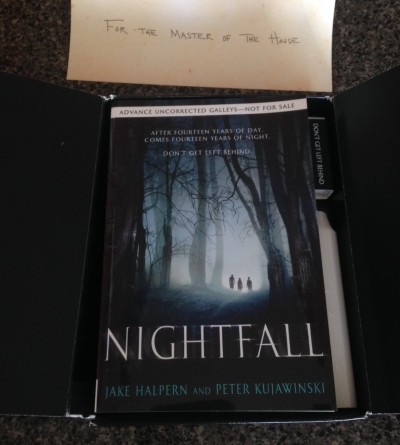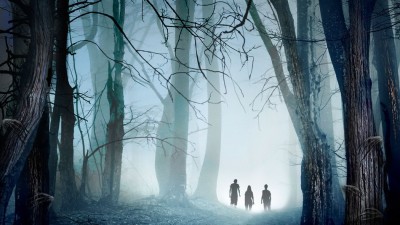While atmospheric and loaded with potential, Nightfall falls short of the mark in terms of scares or general plot cohesion. In plain words, Nightfall is readable, but ultimately a forgettable disappointment of a novel.
Author: Jake Halpern & Peter Kujawinski
Genre: Horror, Speculative Fiction, Young Adult
Publisher: G.P. Putnam Sun’s for Young Readers
Publication Date: July 2015
Paperback: 368 pages
The dark will bring your worst nightmares to light, in this gripping and eerie survival story, perfect for fans of James Dashner and Neil Gaiman.
On Marin’s island, sunrise doesn’t come every twenty-four hours—it comes every twenty-eight years. Now the sun is just a sliver of light on the horizon. The weather is turning cold and the shadows are growing long.
Because sunset triggers the tide to roll out hundreds of miles, the islanders are frantically preparing to sail south, where they will wait out the long Night.
Marin and her twin brother, Kana, help their anxious parents ready the house for departure. Locks must be taken off doors. Furniture must be arranged. Tables must be set. The rituals are puzzling—bizarre, even—but none of the adults in town will discuss why it has to be done this way.
Just as the ships are about to sail, a teenage boy goes missing—the twins’ friend Line. Marin and Kana are the only ones who know the truth about where Line’s gone, and the only way to rescue him is by doing it themselves. But Night is falling. Their island is changing.
And it may already be too late.
Stand alone or series: Standalone novel
How did I get this book: ARC from the publisher
Format (e- or p-): Print
Why did I read this book: I received a super fancy ARC from the publisher with intriguing instructions “to the master of the house”–and then I read the synopsis and was instantly hooked.
Review:
The island of Bliss is the only world Marin, Line, and Kana have ever known. Daylight is all they’ve ever known. Every fourteen years Bliss enjoys an interrupted period of daylight–but the period of prolonged day is inevitably followed by fourteen years of night. For Marin, the coming of her first nightfall is both ominous and saddening, for it means that everyone–including her mother, father, and twin brother Kana–must leave Bliss for the Desert Lands. It also means that her friendship with Line must come to an end, as Marin must assume her birthright, taking to the cloisters in solitude with only other desert women as her companions.
As hard and saddening as her future seems, above all else Marin knows that she and every other living soul must leave the island before night comes. Because at nightfall, Bliss is covered in ice, cloaked in darkness, and the monsters roam.
But when the time comes to board the furriers’ boats and take their leave of Bliss, Line is nowhere to be found. Marin and Kana are desperate to find their friend before the tides change and night arrives–but they are too late.
Now the three will learn the horrific truth about darkness on Bliss, and must figure out a way to survive the long, frozen night.
Oh Nightfall, I really wish that we could have hit it off. You have so much potential–an intriguing premise with your prolonged periods of day and night, the strange instructions left for day dwellers to clean and rearrange their homes for their nighttime masters, the questioning young teenagers left behind who must think quickly and work together in order to survive. All of that should have added up to a bonafide nail-biter… but alas. While atmospheric and loaded with potential, Nightfall falls short of the mark in terms of scares or general plot cohesion. In plain words, Nightfall is readable, but ultimately a forgettable disappointment of a novel.
At the onset, Nightfall is delightfully tantalizing, and the book perfectly embodies the power of the pregnant pause. You know what I’m talking about–it’s that teasing moment before shit goes down, the instant preceding the monster lurking in the dark as the the heroine walks up the stairs and rounds a corner. Nightfall excels in this moment and its early chapters, building an atmosphere of fear and a town desperate to maintain the status quo as their ancestors have for generations. The tension grows beautifully in these early chapters, especially as Marin and her friends follow the mysterious instructions handed down from their parents to move furniture in strange patters and hang frightening carcasses and relics. There are many poignant questions asked at the onset of Nightfall–where is this island? Why are these traditions happening? What comes in the dark and why do these people keep coming back every fourteen years when the journey and life itself on Bliss is so harrowing? All of these questions really are asking just one question: why?
Of course, the problem with a tantalizing premise like this, and such a huge encompassing question, is that the novel is only as good as its answers (or its promise to answer things). Nightfall, disappointingly, has few answers. Alongside Marin, Line, and Kana, we readers learn that a lot of things happen in Bliss because that’s the way it has always been done–the villagers prepare for the long journey to the Desert Lands, they pay the furriers in goods and food to ferry them to their second home, they follow strange instructions to clean and ready their homes on Bliss to coincide with the coming of night. Marin questions that logic actively in the text, but is met with the same bland answers that things are the way they are because that’s the way they are. It’s not satisfying for Marin (and certainly not satisfying for me as a reader, either).
Beyond the lack of answers, however, the most frustrating thing about Nightfall is the fact that nothing really happens. Well, that’s inaccurate. A lot of stuff happens, but all of it is useless action and manufactured tension. There’s no larger thought or plot–the premise is all there is, and then three kids running around from danger to danger, climbing trees and cliff walls as they try to evade the monsters in the dark and find a way to leave the island. There are no huge revelations about the world or why things happen, just that…they do. It’s a little disappointing, to say the least.
And when the plotting doesn’t work, everything else gets scrutinized. For example, let’s look at the worldbuilding and rule-defining in this book. How do the 14 years of uninterrupted day work? This is fantasy and suspension of disbelief is great and all, but I was hoping for something more than just arbitrary periods for sunrise versus sunset. How can this work with daylight constant for years in one place, and then 6 day night cycles in the desert (a place close enough to travel by ship and sea on smallish fishing vessels)? The analogy for us would be Alaska or northern Scandinavian countries (or areas within the Antarctic circle, to the southern hemisphere), experiencing their polar midnight sun and polar night–but this is because of Earth’s axial tilt, and only lasting for days instead of years, and further changing as the Earth continues its journey around the sun. How does it work for Bliss and the Desert Lands? What are the ecological and societal effects of prolonged daylight? Wouldn’t these be much deeper and more pervasive than monsters and ice–we’re talking about food and crops, diet, animal life, vegetation, behavorial issues. Granted, this is not the point or thrust of the book at all… but I can’t help but wonder because the setting is pure window dressing for manufactured tension, and that drives me to distraction. (As a side note, this book could be a useful example to teach the equinoxes and solstices, to teach about a planet’s tilt and rotation, and to point out nonsense in arbitrary specfic.)
There are other things too–the monsters in the dark, for example. Where are they lying dormant? Is it that they hibernate for fourteen years in their mysterious door vaults in a different dimension (or something)? What do they eat when they come out of that hibernation!? Are they only on the island? Who are the furriers, and how did they even find the Bliss dwellers, and those form the Desert Lands? Why?
All this is exacerbated further by the writing style of the book–simplistic in tone and structure, with awkward chapter breaks and protagonists who tend to react and speak in ways that don’t quite make sense. Characterization suffers as a result of this too, as we get glimmers of promising internal arcs for Marin and brother Kana, for Line and his relationship with both siblings… but glimmers without any actual delivery they remain until the book’s end.
All in all, Nightfall isn’t a bad book–but it’s not one I’d recommend either.
Rating: 5 – Meh. Take it or leave it.













6 Comments
Nightfall by Jake Halpern and Peter Kujawinski | Audiobook Review | Good Books & Good Wine
June 5, 2017 at 6:00 am[…] The Book Smugglers – “nothing really happens“ […]